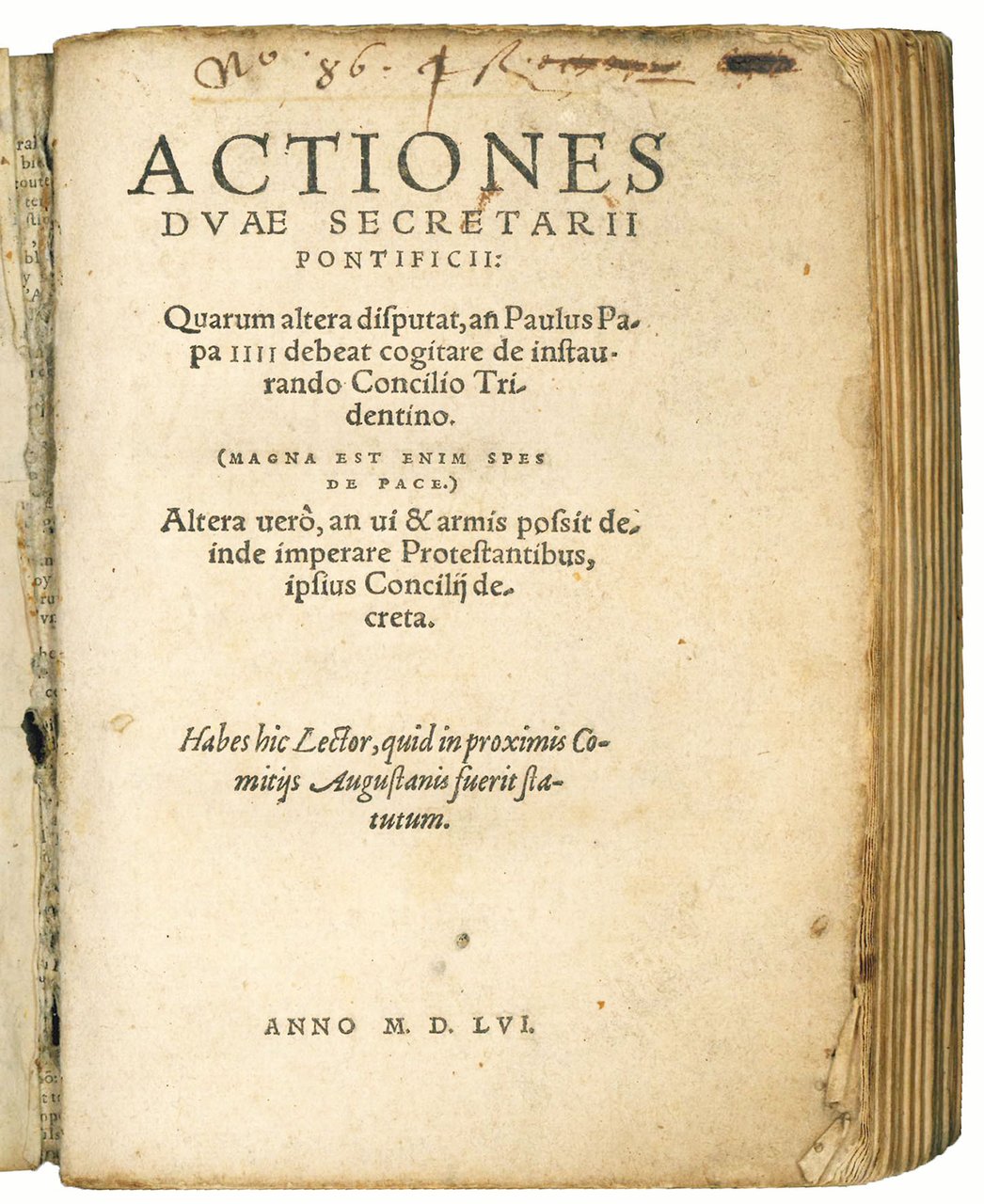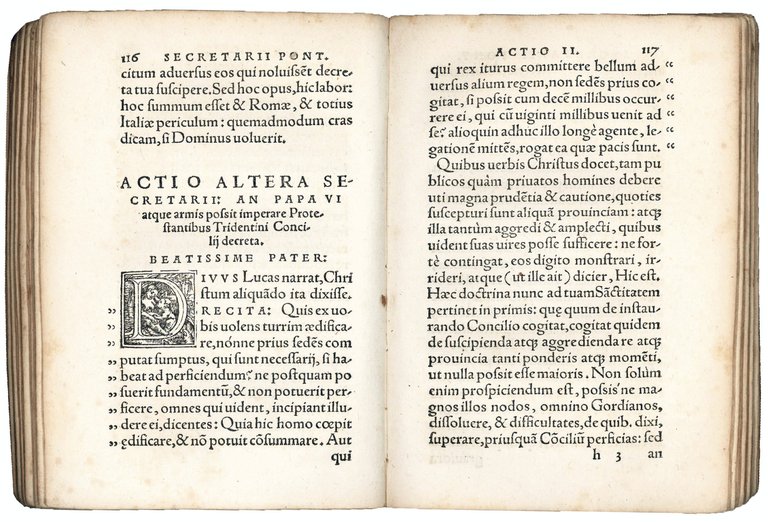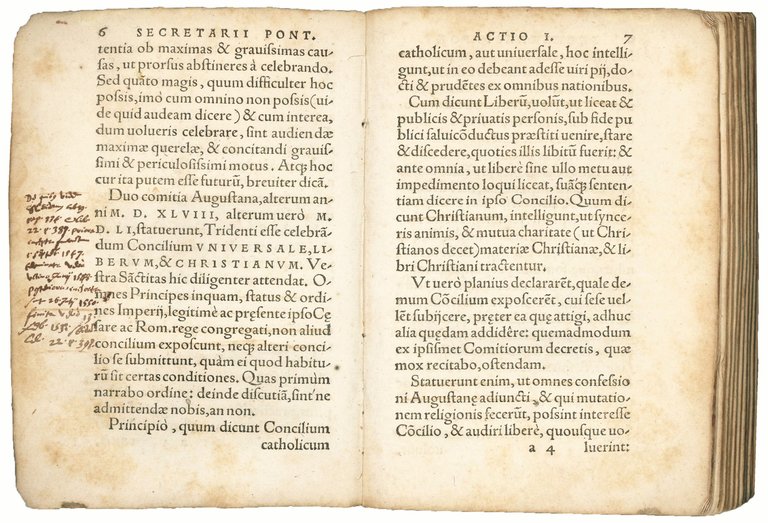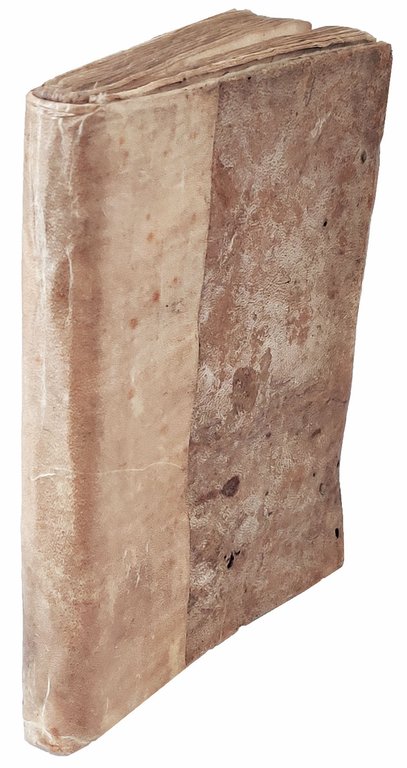



Livres anciens et modernes
VERGERIO, Pier Paolo (1498-1565)
Actiones duae secretarii pontificii: quarum altera disputat, an Paulus Papa IIII debeat cogitare de instaurando Concilio Tridentino. (Magna est enim spes de pace.) Altera verò, an vi & armis possit deinde imperare Protestantibus, ipsius Concilij decreta
[Johann Oporinus], 1556
2800,00 €
Govi Libreria Antiquaria
(Modena, Italie)
Les frais d'expédition corrects sont calculés une fois que l'adresse de livraison a été indiquée lors de la création de la commande. Un ou plusieurs modes de livraison sont disponibles à la discrétion du vendeur : standard, express, economy, in store pick-up.
Conditions d'expédition de la Librairie:
Pour les articles dont le prix est supérieur à 300 euros, il est possible de demander un plan de paiement échelonné à Maremagnum. Le paiement peut être effectué avec Carta del Docente, Carta della cultura giovani e del merito, Public Administration.
Les délais de livraison sont estimés en fonction du temps d'expédition de la librairie et de la livraison par le transporteur. En cas de retenue douanière, des retards de livraison peuvent survenir. Les frais de douane éventuels sont à la charge du destinataire.
Pour plus d'informationsMode de Paiement
- PayPal
- Carte bancaire
- Virement bancaire
-
-
Découvrez comment utiliser
votre Carta del Docente -
Découvrez comment utiliser
votre Carta della cultura giovani e del merito
Détails
Description
Rare first edition of this satire on the council policy of Pope Paul IV, considered by Vergerio one of his most important contributions to this subject (cf. A. Hauser, Pietro Paolo Vergerios protestantische Zeit, Diss., Tübingen, 1980, p. 167), so relevant that he had reprinted it during his stay in Poland a year later (Königsberg, January 1557) with a dedicatory letter to Jan Lutomirski, castellan of Brzeziny (cf. L. Hein, Piero Paolo Vergerio und sein Auftreten in Preussen und Polen-Litauen, in: “Kyrios. Vierteljahreschrift für Kirchen- und Geistesgeschichte Osteuropas”, 5, 1965, p. 165).
“Wie stark die Frage nach dem Verhältnis von Papst, Konzil und Religionsfrieden die deutsche Öffentlichkeit beschäftigte, zeigt auf protestantischer Seite die damals erschienen Schrift Vergerios ‘Actiones duae secretarii pontificii'. Diese Satire auf die päpstliche Konzilspolitik gehört literarisch gesehen zum besten, was Vergerio je schrieb. Er lässt den ‘Actiones' einen Sekretär Pauls IV. auftreten, der dem Papst an zwei aufeinanderfolgenden Tagen Vortrag über die Konzilfrage und Deutschland hält. Vergerio hat das Manuskript dieser Schrift vor der Publikation von den französischen Gesandten in der Schweiz durchsehen lassen, mit denen er von Württemberg aus in ständiger Verbindung stand. Er konnte sich bei der Abfassung wohl auch auf unmittelbare Berichte aus Rom stützen. Seine dortigen Vertrauensmänner darf man am ehesten in der Umgebung des Kardinals du Bellay suchen […] Aber die Aporie von Konzil und Religionsfrieden, die er mit sarkastischer Feder darstellte, traf zu. Mit vorwegnehmender Schärfe zeigte er die Endgültigkeit, die dem Weg des deutschen Protestantismus von dem Reichsabschied des Jahre 1548 zu jenem von 1555 innewohnte. Er zeigte, wie diese Entscheidung über den deutschen Raum hinaus jeder Wiedereröffnung des Trienter Konzils einen veränderten und reduzierten Charakter geben wird” (‘The extent to which the question of the relationship between the Pope, the Council and religious peace preoccupied the German public can be seen on the Protestant side in Vergerio's Actiones duae secretarii pontificii, which was published at the time. From a literary point of view, this satire on papal politics is one of the best Vergerio ever wrote. The Actiones features a secretary of Paul IV who lectures the pope on two consecutive days about the Council and Germany. Before publication, Vergerio had the manuscript of this work reviewed by the French envoys in Switzerland, with whom he was in constant contact from Württemberg. It is also likely that he was able to rely on direct reports from Rome. His informants there are probably to be found in the circle of Cardinal du Bellay […] But the impasse of the Council and the religious peace, which he depicted with a sarcastic pen, was true. With anticipatory acuity, he showed the finality inherent in the path of German Protestantism from the imperial decree of 1548 to that of 1555. He showed how this decision would give a changed and reduced character to any reopening of the Council of Trent outside of the German sphere') (H. Lutz, Christianitas afflicta. Europa, das Reich und die päpstliche Politik im Niedergang der Hegemonie Kaiser Karls V., 1552-1556, Göttingen, 1964, pp. 469-470).
Pier Paolo Vergerio was born in Capodistria, a few miles south of Trieste on the Istrian peninsula, which then was subject to the republic of Venice. He was the son of a local notable and the descendant of the renowned humanist Pier Paolo Vergerio the Elder. He obta

